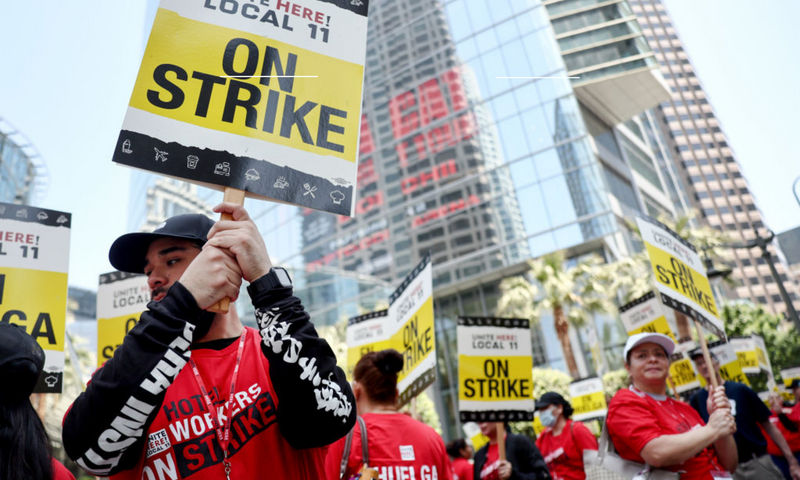Hotel workers picketed for the third time in Los Angeles, Calif. This is after around 15,000 hotel workers in Los Angeles and Orange County went on strike over the busy holiday weekend on July 4th. The strike, led by The union, UNITE HERE Local 11, is demanding better wages, benefits, working conditions, a 7 percent charge on tabs to go to a hotel worker’s fund to address their housing needs, for the cities estimated 70,000 hotel workers.
The hotel workers, who are mostly Latina and immigrant women, are paid an average of $20-25 an hour, which doesn’t align with the living wages in Los Angeles. They are seeking five dollars more and basic benefits, such as retirement, health insurance and paid sick leave.
The strike started after hotel leaders canceled a negotiation meeting with the Union and its members scheduled for June 28th, then the current contract between the hotels and workers expired June 30th and now they have failed to reach a contract after workers rejected a new proposal by hotels this week.
The strike had a significant impact on the city's hotels and office buildings during the busy holiday weekend and tourism season. Many hotels were forced to reduce their services, and many businesses have been unable to operate due to the lack of cleaning staff. The strike is also having a ripple effect on the local economy. It is unknown the strike’s estimated cost of lost revenue to the cities.
Although the hotel workers on strike took a break from picketing the day after the July 4th weekend the strike is ongoing, and it is unclear when it will end.
The union, UNITE HERE Local 11 has said that the strike will continue until the hotel workers demands are met.
The Los Angeles hotel workers strike is part of a larger movement of low-wage workers fighting for better wages and working conditions. In recent years, there have been strikes by fast food workers, hotel workers, and other low-wage workers and currently the Hollywood writer’s strike across the country. These strikes have put a spotlight on the issue of income inequality and the need for higher wages for all workers. The strike is a powerful example of how low-wage workers are fighting for a better future.
According to the union, low-wage workers are fed up with being underpaid and overworked, and they are taking action to demand change. Union members believe hotel workers should be able to afford to live in the cities they work for and not commute two to three hours a day. The strike is a powerful reminder that low-wage workers are essential to the economy, and they deserve to be treated with dignity and respect.
The Los Angeles and Orange County hotel workers’ strike of 2023 was a watershed moment for the city's immigrant community. The strike has been ongoing for almost a month and brought attention to the plight of low-wage workers and the disparities they face.
The Los Angeles hotel workers’ strike is a show of strength and solidarity for low-wage workers and the immigrant community. It showed that when workers come together, they can make a difference.
Hotel workers in California last staged a major strike in 2018, when nearly 8,000 housekeepers, bartenders and others walked off the job at 23 Marriott hotels in eight U.S. cities, including San Diego, San Francisco, Oakland and San Jose. That strike lasted more than two months before contract agreements were reached.
The walkout is “the first of many actions that may come this summer by workers at hotels across Southern California,” said Kurt Petersen, co-president of Unite Here Local 11 in a statement to the Los Angeles Times.






